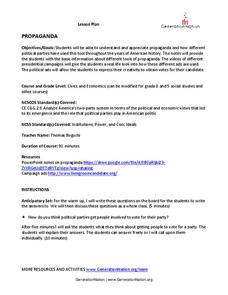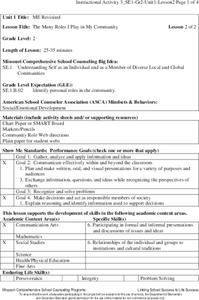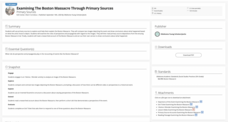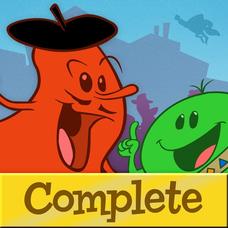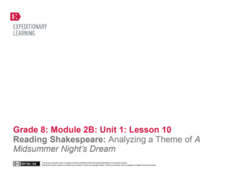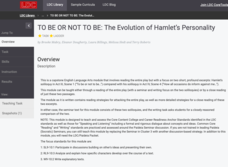National Endowment for the Humanities
Lesson 4 James Madison: Internal Improvements Balancing Act—Federal/State and Executive/Legislative
Who has the power? The founding fathers asked the same question when the United States was formed. Learners explore issues that arose during Madison’s presidency that raised constitutional questions. Through discovery, discussion, and...
Missouri Department of Elementary
How We Are Alike And Different
Scholars develop social awareness by exploring the concept of similarities and differences. Learners examine two beverages and use a Venn diagram to identify similarities and differences. They tally each item to identify if they are more...
Missouri Department of Elementary
Character Clovers
Build a classroom community with a lesson that uses character clovers to examine scholars' roles. Following a whole-class discussion, participants list four roles they play and accompany it with the character traits that go along with it.
National Woman's History Museum
Getting with the Program
A seven-step instructional activity introduces the emergence of computer sciences and the contributions women made to the profession after World War II. Several science experiments offer pupils a hands-on learning experience that...
Scholastic
Hopes and Dreams
A lesson encourages mini scholars in setting goals. Peers share their hopes and dreams and discuss how each one adds to everyone's unique character. Class members draw themselves in a scene achieving a goal. A follow-up meeting allows...
Generation Nation
Propaganda
How does propaganda influence our vote? Through grand conversation, scholars gain information about what is and how to identify the different ways propaganda is used in a presidential election. Using their new-found knowledge, citizens...
Northeast Georgia Regional Educational Service Agency
The American Revolution
An empowering lesson explores the causes and complaints that led to the American Revolution. Young scholars, starting in fourth grade, complete hands-on activities, role play, and create cartoons to understand the American Revolution and...
Missouri Department of Elementary
The Many Roles I Play in My Community
Small groups brainstorm their roles in the community. Then, individually, complete a community roles web worksheet. Peers share their completed product and extend the conversation to include the feelings and character traits that go...
PBS
Alexander Hamilton: Lawyer, Writer, and Founding Father
Scholars analyze the impact Alexander Hamilton had on the creation of the United States. Primary documents and video clips give learners a glimpse into the life of one of America's Founding Fathers, arming them with enough information to...
K20 LEARN
Words Before Blows: Julius Caesar
Scholars examine how Brutus and Mark Antony employ ethos, pathos, and logos in their speeches to persuade the angry crowd in Act 3, scene 2 of William Shakespeare's tragedy, Julius Caesar. To set the stage, groups first identify the...
PhysEdGames
Rock, Paper, Scissors Champs
The goal of the activity is for participants to win as many rounds of Rock Paper Scissors as they can. Pupils spread out across the gym and play rock paper scissors with random people. The player that loses must get behind the person who...
K20 LEARN
Examining The Boston Massacre Through Primary Sources
The Boston Massacre is the focus of a lesson plan that explores primary sources. Scholars examine two primary source images and discuss the different perspectives on the historical event. After groups read a researched account, they...
Grammaropolis
Grammaropolis - Complete Edition
Allow the residents of this grammar-packed city to teach your pupils the parts of speech with songs, videos, quizzes, and more. Kids can get to know each part of speech and sing along with the catchy tunes!
Missouri Department of Elementary
Put Yourself in Check
The final lesson in a four-part unit on conflict resolution offers middle schoolers strategies for how to keep themselves in check when involved in conflicts. A role-play activity and a reflective journal stress the importance of...
EngageNY
Reading Shakespeare: Analyzing a Theme of A Midsummer Night’s Dream
After finishing Act I, scene 1 from Shakespeare's A Midsummer Night's Dream, class members study the theme of control as it relates to the play and start an Evidence of Control note-catcher worksheet.
Star Wars in the Classroom
"Shakespeare and Star Wars": Lesson Plan Day 3
To make the point that there are many forms of language, each with its own purpose, class members select 10 lines from Doescher's play, translate these lines first into contemporary English and then into "SMS/Tweet."
Street Law
Mock Trial - Shawn Wright v. Play and Learn Childcare Center
A child breaks his arm while at daycare. Was the staff negligent? That is the question at the heart of the mock trial case, Shawn Wright v. Plan and Learn Childcare Center.
IRISS
Exploring Self-Esteem 1: What Is Self-Esteem?
Adolescents explore self-esteem and the various factors that influence a person's sense of self in this four-part lesson series. Through a combination of whole class instruction, small group discussions, and independent work, students...
Novelinks
The Winter’s Tale: Problematic Situation
Before beginning The Winter's Tale groups read and discuss a scenario that parallels the plot of Shakespeare's play. They then brainstorm possible solutions to the problem.
Penguin Books
A Teacher's Guide to the Signet Classics Edition of Macbeth by William Shakespeare
Double, double scholars' appreciation of the Scottish Play with a guide that adds a rich brew of pre-reading background information, chapter discussion questions, activities, and writing prompts to provide readers with a "firm and good"...
Missouri Department of Elementary
What are Comfortable (Good) and Uncomfortable (Bad) Feelings?
Two puppets open a discussion about comfrotable and uncomfortable touches. Scholars add to the discussion information they remember from a previous lesson, then delve deep into three problem-solving safety rules, and explore...
Missouri Department of Elementary
Healthy Touches and Private Touches
Scholars identify the difference between healthy touches and private touches. A discussion leads pupils to recognize several trusting adults. Peers role-play scenarios in which they use three rules to remain safe.
Workforce Solutions
Speed Interviewing
An important part of the job search process is the personal interview. Help pupils prepare with speed interviewing activity—teams of three-act as a job seeker, interviewer, and observer. Every three minutes, participants rotate roles and...
Literacy Design Collaborative
To Be or Not to Be: The Evolution of Hamlet’s Personality
How does Hamlet's state of mind change over the course of Shakespeare's most famous revenge tragedy? After a close reading of Hamlet's soliloquies in Act III, scene 1 and Act IV, scene iv, class members engage in a Paideia/Socratic...







